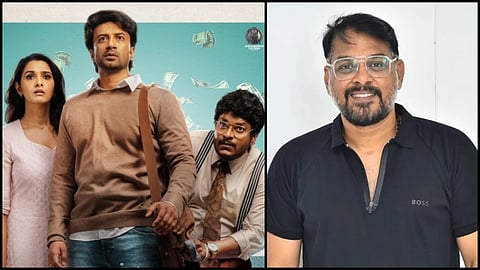

Writer-director Eashvar Karthic, whose upcoming film Zebra hits theatres this Friday, worked at 32 companies for short spans before he considered a foray into the film industry. The last of these jobs was at a bank, Eashvar informs, which incidentally turned out to be a crucial factor when he decided to write a script for Zebra. He adds, "In the banking sector, there are many mistakes that are often made, which lead to big errors—not necessarily crimes—but they never come into the limelight. I wanted to do that. I also spoke to a friend of mine for further understanding. If I have to work and research a concept, I need to first commit myself 100 percent to the idea.”
When further asked about the origin point of Zebra as a concept, the director describes an image. “A corporate guy wearing a tie and with folded sleeves—what if he goes for a fight? I thought of building a character on this ground.” However, while working on the idea, the writer-director soon realised that it wasn’t exciting enough for a full-length feature film and hence decided to incorporate other worlds in this universe. "That's where the world of money laundering came in. There are many ways in which money laundering takes place around us, so Daali Dhananjay’s world comes there,” he states.
The director candidly talks about his earlier stints in the film industry before deciding to turn to writing and direction. “After quitting my job, I didn’t know where to go. But I had interest in cinema, so I joined the junior artist association.” Eashvar further recalls his junior artist days in a light-hearted manner. “However, you wouldn’t get calls every day. And even if you did, I was often standing in the last row. Nobody would believe it if I were to play a rowdy or a side henchman,” he adds with a chuckle.
It was later that, while helping his friends during their short filmmaking stints, he gradually learnt the craft of scriptwriting. Eashvar had other writing plans on his mind as well, such as a book on human psychology, before he decided to focus on screenplay writing, gradually moving in that direction. “I had a lot of free time then, you see,” he laughs.
Produced by Old Town Pictures and Padmaja Films, Zebra is slated to release in multiple language versions simultaneously. The film’s primary cast, too, boasts of prominent names from across the South Indian industries, like Sathyaraj, Daali Dhananjaya, Satyadev, Satya, and Priya Bhavani Shankar. Talking about these diverse casting choices, Eashvar states, “Satyadev and I met in Hyderabad, and he agreed to do the film within a one-hour script narration. However, to attain a certain production value for my film, I needed a certain budget. We wanted to expand into the Kannada market, so we brought Daali Dhananjaya on board. My producers gave me the option of casting Sathyaraj, and he agreed. Similarly, Priya Bhavani incidentally helped take the film to the Tamil audience. These casting choices from various industries gave that much-needed market support.”
The music for Zebra has been composed by Ravi Basrur, who is best known for his dramatic, larger-than-life score for films like the KGF franchise and Salaar. However, Eeshvar claims that the audience will get to explore a new facet of Ravi’s creativity in his film. “My film is a musical crime story, so music is very important to the story here. While there are eight songs in the film, each belonging to a different genre, Ravi has also given the background score for Zebra. There are many montages and scenes with character shifts, and Ravi’s music captures the three different worlds of the story with different instrumentations. You will see a new side to Ravi Basrur this time.” Talking about his connection with music, Eeshvar shares that he writes his scripts while listening to music and particular soundtracks. It helps him find the tone of his stories, he says. The filmmaker adds that he often played music on sets or made his actors listen to certain music pieces, the same music he heard while writing, to help them get into a certain mood and understand the emotion of the scene.
Eashvar’s debut film Penguin, which starred Keerthy Suresh in the lead, did not receive much acclaim when it released on OTT. Recalling his learnings from his debut film, Eashvar states, “Life is a process of continuous learning. Usually, we start from zero. If a movie works, we move up a notch—let’s call it ‘plus one’. Some stay there on zero even after a failure. But after Penguin, I went to'minus one’. I couldn't fulfil the expectations people had from that film. There were problems with my writing.” The director candidly shares that he feels twice as much responsibility to prove his mettle with Zebra. “I need to make double the effort to move up now. This time, I need to meet those expectations. I hope Zebra brings me to that ‘plus one’ zone,” he concludes.